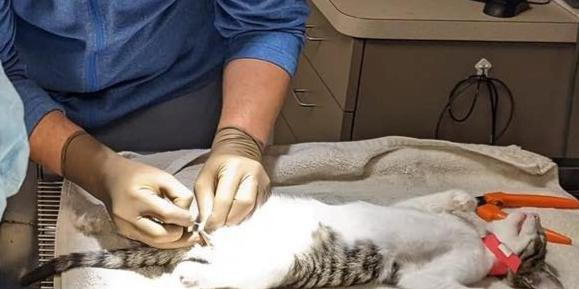Why Should I Spay or Neuter my Pet?

- posted: Jun. 18, 2023
Why Should I Spay or Neuter my Pet?
Animal shelters and veterinarians routinely recommend spaying or neutering pets, primarily to reduce overpopulation. But what are the pros and cons to spay/neuter and, when is the best time for this surgery? Let’s learn more in this week’s blog!
First, what happens when a pet is spayed or neutered? The term, “spay” is thought to have its origin in the Greek word, “spathe” or blade, referring to use of a scalpel to perform the surgery. A spay is an ovariohysterectomy in which the female’s ovaries and uterus are removed. While the term “neuter” means “neither sex” it has traditionally been used to refer to altering a male. Neuter refers to castration in which both testicles are removed. While other forms of alteration exist such as vasectomy or ovariectomy (removal of ovaries only), these are less commonly performed in veterinary medicine.
What are the benefits to having your pet spayed or neutered? Obviously, the main reason is to prevent breeding. However, there are other health benefits to spaying or neutering as well.
For females, spaying drastically reduces the chance of developing mammary (breast) tumors as the dog or cat ages. The chance of developing mammary tumors is less than 1% if spayed before a female goes into heat, 8% if the pet has one heat cycle and 25% if she goes through 2 or more cycles. A spayed female will also not experience a “heat” or estrus cycle--similar to a menstrual cycle--during which time she can be bred and become pregnant. Dogs have about 2 cycles per year. Cats will cycle every few weeks. Spaying also prevents a life-threatening condition called pyometra in which the uterus fills with pus and can cause the female to become extremely ill and potentially septic if not treated. As for pets such as ferrets and rabbits, spaying is essential in preventing a serious form of anemia in ferrets and in reducing the risk of reproductive cancers by about 80% in rabbits and can also lower aggression.
For males, neutering reduces the risk of prostate enlargement in older pets as well as eliminates the risk for testicular cancer. Neutering also reduces behavioral issues such as urine marking, fighting and aggression and roaming behavior. Intact males often have very strong-smelling urine—neutering animals such as cats, rabbits and ferrets also reduces this urine odor. Neutering ferrets, rabbits and rodents can also prevent testicular tumors and aggression.
Are there contraindications to spay and neuter? Normal surgical risks such as complications under anesthesia, complications with incisions healing and post-operative infections are the most common issues encountered with spaying or neutering a pet. Post-operative bleeding is also a potential but rare complication. Complication rates are low, but some pets do experience issues. Are there other health risks? For dogs, maybe. About ten years ago, it was noted that large and giant breed dogs who were spayed or neutered before six months of age developed longer, thinner bones due to lack of circulating sex hormones. These dogs appeared to be at increased risk of developing some orthopedic issues such as hip dysplasia, cruciate ligament tears and others. In addition, females spayed before six months of age have a higher risk of developing urinary incontinence after the age of three than those spayed after six months of age. Spaying and neutering seems to increase the risk of some types of cancer in some breeds and decrease the risk of others. In truth, the pros and cons of spaying or neutering dogs are a bit more complex and an honest discussion with your veterinarian is the best way to determine the right path for your dog.
For small dogs (less than 50lbs as adults) and cats, spaying around 4-6 months of age is still acceptable and recommended. Many ferrets are already spayed or neutered before being sold as pets. For dogs over 50 lbs., current studies advocate waiting until the pet is fully mature at 12-18 months of age. Again, talk to your vet about pros, cons and the best time to spay or neuter your pet.
This blog is brought to you by the Patton Veterinary Hospital serving Red Lion, York and the surrounding communities.
https://www.akc.org/expert-advice/news/is-spaying-neutering-always-the-best-choice/
https://www.avma.org/resources/pet-owners/petcare/spaying-and-neutering
https://americanvethospital.com/importance-veterinary-pocket-pets/
Location
Patton Veterinary Hospital
425 E Broadway
Red Lion, PA 17356
